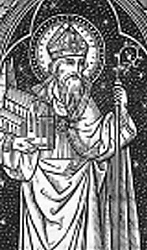 St. Ludger
Name: St. Ludger
Date: 26 March
Saint Ludger was born in Friesland (the Netherlands) about the year 743. His father, a nobleman ofthe first rank, at the child’s own request, committed him very young to the care of Saint Gregory,Bishop of Utrecht, a disciple of Saint Boniface and his successor in the government of the see ofUtrecht. Saint Gregory educated him in his monastery of Utrecht, and gave him the clerical tonsure. Ludger, desirous of further religious studies, passed over into England, and spent four and a halfyears under Alcuin, Rector of a famous school at York. In 773 he returned home, and when SaintGregory died in 776, his successor, Alberic, compelled Saint Ludger to receive the priesthood. The new bishop employed him for several years in preaching the Word of God in Friesland, where heconverted great numbers, founded several monasteries, and built many churches. The pagan Saxonsthen entered and ravaged the country, and drove out the missionaries. Saint Ludger traveled toRome to consult Pope Adrian II as to what course he should take, and what he thought Godrequired of him. He then retired for three and a half years to Monte Cassino to study SaintBenedict’s Rule; there he wore the habit of the Order and conformed to its practices during his stay,but made no religious vows. In 787, Charlemagne overcame the Saxons, conquering Friesland and the coast of the GermanicOcean as far as Denmark. Saint Ludger was sent by the Emperor, who had heard of him, toevangelize the pagans of five districts; thus he returned into East Friesland, where he brought theSaxons to the Faith, with the province of Westphalia. He founded the monastery of Werden, twenty-nine miles from Cologne. In 802, Hildebald, Archbishop of Cologne, in spite of his strenuousresistance, ordained him Bishop of Munster. He joined to his diocese five cantons of Friesland whichhe had converted, and founded the monastery of Helmstad in the duchy of Brunswick. Being accused to the Emperor Charlemagne of wasting his income and neglecting the embellishmentof churches, that prince ordered him to appear at court. The Saint, when he was summoned beforethe Emperor, was at prayer, and told the messenger he would follow him as soon as he had finishedhis devotions. He was sent for three times before he was ready, and his delay was represented to theEmperor by the courtiers as contempt for his Majesty. The Emperor, with some emotion, askedSaint Ludger why he had made him wait so long, though he had sent for him often. The bishopanswered that although he had the most profound respect for his Majesty, yet God was infinitelyabove him; that while we are occupied with Him, it is our duty to forget everything else. Thisanswer made such an impression on Charlemagne that he dismissed him with honor and disgraced hisaccusers. Saint Ludger was favored with the gifts of miracles and prophecy, but desired that these not bepublished. His last sickness did not hinder him from continuing his functions up to and including thelast day of his life, which was Passion Sunday. On that day he preached very early in the morning,said Mass towards nine, and preached again before nightfall, in another town. He told those withhim that he would die during the night, and indicated a place in his monastery of Werden where hewished to be interred. He died as he foretold, on March 26, 809. |